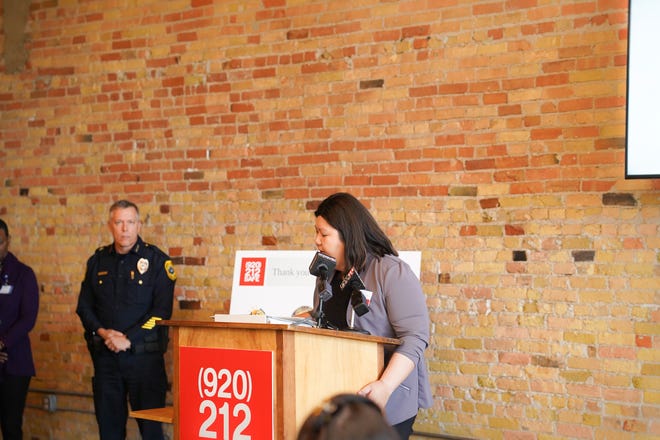- Police in the county responded to nearly 900 incidents in 2021.
- Golden House, a shelter for survivors, had to turn families away because it was full.
- A coalition of groups launched the Be Safe Campaign to offer more resources.
On the day of a fundraiser meant to bolster support for a local domestic violence shelter, a young woman in Ashwaubenon was shot to death by her ex-boyfriend. Nearby on the same day, a mother of five young children barely survived her partner’s abuse.
The two tragedies drew a shadow over the Show of Strength program, an event organized by Green Bay’s Golden House last October. Cheeia Lo, executive director, said that the death of the young woman ― a nurse ― marked the third death from domestic violence in Brown County that year.
This last spring, after news spread of a man murdering a woman in front of her children, Green Bay Mayor Eric Genrich called a meeting with Lo to figure out what they could do to address the mounting public health crisis of domestic violence.
“(Genrich) said to me ‘Golden House can’t do this alone’ and he said he would talk to the (Green Bay) police chief to see how the city, the county and how everybody can get together to do this campaign, to raise this awareness,” Lo said. “We needed to come together to help individuals and families affected by domestic violence.”
The coalition developed Be Safe, a new campaign that uses Brown County resources to connect victims of domestic violence with staff at Golden House on a 24/7 basis. Victims and concerned loved ones can call 920-212-SAFE, which will direct callers of all ages to trained staff at Golden House, including access to a child therapist. The campaign has multiple purposes, chief among them is getting people under threat the help and support they need, but those involved in the campaign also hope awareness breaks a stigma.
Stigma, Lo said, is one of the main reasons so many people don’t report abuse. Many survivors she’s worked with are afraid that going to the police will make the abuse worse. Many victims fear judgment of others and see consequences to coming forward, such as losing their job should an employer find out, or embarrassing their children and family if word of the abuse got out.
The onus, in other words, falls on the survivor and not the abuser.
“Domestic violence is prevalent ― it can happen to anybody. It doesn’t matter what your demographic is, your economic status, your background, your religion, or your gender,” Lo said.
Since 2019, rates of domestic violence have soared. Golden House worked on service support for 1,469 survivors in 2019, but two years later the staff helped 2,145 survivors. That’s a nearly 50% jump in needs.
By the end of 2021, Brown County law enforcement had responded to nearly 900 incidents of domestic abuse, up from 837 calls in 2020. Golden House’s shelter, made up of 11 rooms, could not keep up with the demand and was forced to turn away 130 families, Lo said.
The year-to-date number of domestic violence cases is 613, according to Golden House’s latest domestic violence order numbers.
Last year in Green Bay alone, the Police Department responded to more than 500 reports of domestic violence, resulting in 530 people being charged for 1,046 offenses, including disorderly conduct, simple battery and criminal damage, according to Green Bay Police Chief Chris Davis. The National Coalition Against Domestic Violence released a new report “Remember My Name” on Wednesday stating that 467 people were killed by intimate partners in the US ― and 80 of the victims were in Wisconsin.
“That’s about 17% of individuals killed last year in Wisconsin,” Lo said. “And every minute, 20 people are victims of domestic violence. That’s equivalent to over 10 million individuals a year. These are stats that are from reporting individuals and these are also adults. It doesn’t factor in how many kids are affected by this .”
Be Safe Campaign aims to ‘eliminate the root causes of violence in our community’
Davis, the police chief, said multiple factors prevent victims from seeking help, but often it comes down to not knowing where to turn. Even if a victim takes the necessary steps with the police, abusers need to be held more accountable for their crimes.
Golden House has been working with the Green Bay Police Department and the rest of the justice system to make it harder for abusers to get away with these crimes, including efforts to increase bail for offenders. Accountability, Lo hopes, can send the message that “there was nothing (the victim) could have done ‘better’ to stop him from hitting (them). It boils down to the abuser.”
Cellcom has partnered with the Be Safe Campaign and is at work on establishing a textline and app for the campaign.
Be Safe’s campaign partners range from Golden House and O’Connor Connective to the Green Bay Police Department, the city of Green Bay, Brown County, Prevea, Bellin Health and Cellcom. Bridget O’Connor, owner and president of O’Connor Connective, the consulting firm that developed the campaign, said they’re hoping more local organizations join their campaign to “double, triple and quadruple” the spread of its messaging. That way, the campaign can grow, in terms of collaboration, partnership and visibility.
“As we gain community partners, we’re able to provide that connection between the person who’s struggling and dealing with this and the resources that are here that can help them,” O’Connor said.
Two years ago, Golden House coordinated with local law enforcement officers to create a high-risk domestic violence team. A household is considered high risk if an individual scores high ― six or higher ― on the Lethality Assessment, which includes questions about the frequency of police calls and whether their partner owns a gun.
Of the 483 cases that relied on the Lethality Assessment screen, 51% of the individuals reporting were considered high risk, meaning these individuals are at a higher risk of being killed by their intimate partners, Lo said.
Assessing the root cause of violence is where Golden House and law enforcement officers can really work together.
“So many victims are afraid of their abusers or do not know what steps they can take to help them be safe,” Davis said. “That is why Golden House is an invaluable partner and community resource to help those in need, and to help identify and eliminate the root causes of violence in our community.”
Ways to get immediate help
Lo emphasized that if it’s an emergency matter, always call 911. But if the abuse in Brown County is ongoing, calling 920-212-SAFE can give victims a strategy and plan to leave their abusive environment.
“Leaving can be the most dangerous step,” Lo said. “But it’s about having a plan of action. We can help you.”
- Call 920-212-SAFE to be connected with a domestic violence specialist over the phone.
- Text 920-770-6415 to communicate with a domestic violence specialist via text.
- Fill out this Be Safe Campaign form, noting whether it’s safe to call back by phone or if there’s an alternative means of contacting you. The Be Safe website has a “Quick Exit” setting, which will bring users to Google.com and remove the site from your search history.
Natalie Eilbert covers mental health issues for USA TODAY NETWORK-CENTRAL WISCONSIN. She welcomes story tips and feedback. You can reach her at [email protected] or view her Twitter profile at @natalie_eilbert. If you or someone you know is dealing with suicidal thoughts, call the National Suicide Prevention Lifeline at 988 or text “Hopeline” to the National Crisis Text Line at 741-741.







Comments are closed.